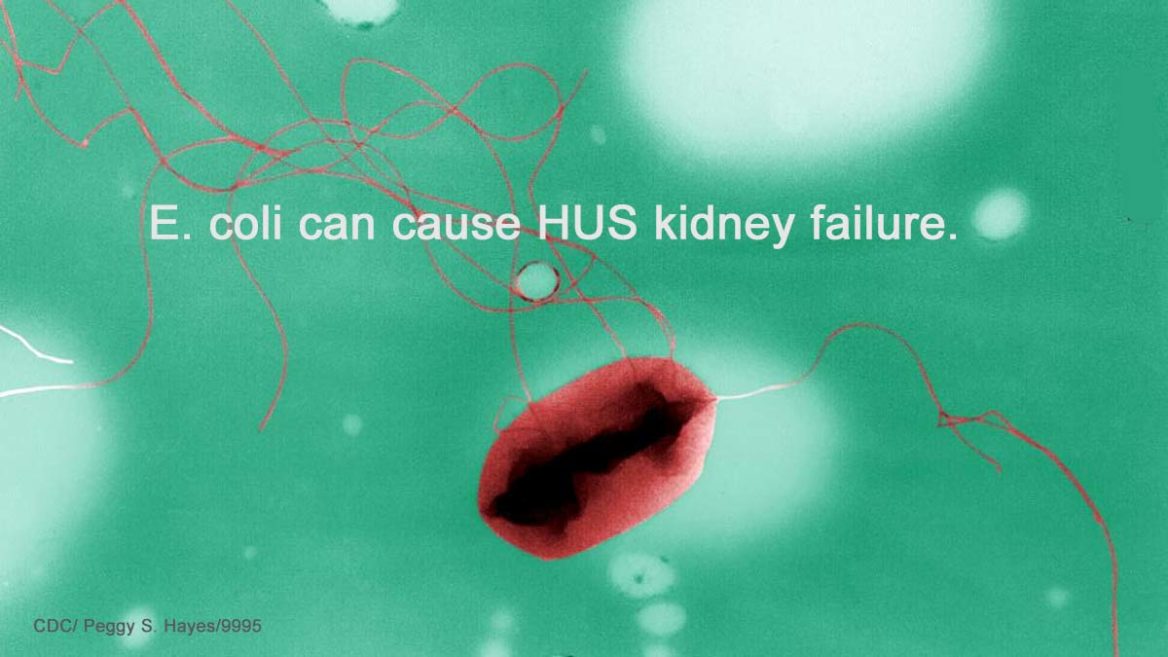The best treatment for E. coli poisoning, a bacterial infection, is staying hydrated by drinking water, a lot of water. This is needed because so much fluid is being lost with severe diarrhea. Most hospitalizations are caused by severe dehydration, which can happen quite quickly.
The CDC warns not to use antibiotics to treat this infection.
“There is no evidence that treatment with antibiotics is helpful, and taking antibiotics may increase the risk of HUS. Antidiarrheal agents like Imodium® may also increase that risk.”Centers for Disease Control and Prevention
Illness from E. coli is almost always preventable, but food companies do not always put food safety before profits. If you or your loved one has this preventable illness, you can contact our E. coli lawyers using the form below to find out if you can get a money settlement.
What if My Child Gets E. coli and Then Develops Hemolytic Uremic Syndrome?
Children are at greater risk of developing a severe complication of an E. coli infection called hemolytic uremic syndrome, which causes renal failure and other medical problems. If this has happened to your child, we are sorry for what your child and your family are going through. As a note of encouragement, we have seen children recover when there seemed to be no hope.
One of the immediate needs in these cases is funds to pay medical expenses. If you hire our law firm, we will do everything possible to negotiate with insurance companies, hospitals and others to make sure your child gets the best care possible until you and your child get a money settlement from the company responsible for the E. coli infection.
Hemolytic uremic syndrome (HUS) in children is almost always caused by consuming food or water contaminated with E. coli bacteria. If the source of the contamination can be found, there may be one or more companies that can be sued for medical expenses, pain and suffering compensation, and other damages. Our law firm hires epidemiologists to assist us with investigations. In addition, our attorneys work with health departments to make sure everything possible is done to find the source of the contamination.
When we seek medical expenses in a lawsuit against a grower, food manufacturer, restaurant, or other party, we ask for enough money to cover current medical expenses and estimated future medical expenses. We back this dollar amount up with evidence, including medical records, expert medical testimony, and scientific research regarding the long-term kidney complications from HUS.
Treatment for HUS often includes dialysis, which is a way to remove the waste products and extra water from the blood. The two main types of dialysis are peritoneal dialysis and hemodialysis.
- Peritoneal dialysis. This method uses the lining of the child’s abdominal cavity, the peritoneum, as a filter. A catheter placed in the child’s belly is used to pour a solution containing dextrose (a sugar) into the abdominal cavity. While the solution is in the abdomen, it pulls wastes and extra fluid from the blood. Later, the solution is drained from the belly, along with the wastes and extra fluid. The cavity is then refilled, and the cleaning process continues.
- Hemodialysis. This method uses a machine that carries the child’s blood through a tube to a dialyzer, a canister that contains thousands of fibers that filter out the wastes and extra fluid. The cleaned blood is then returned to the child through a different tube.
Kidney failure in children leads to a multitude of serious health problems because the toxins that would have been eliminated from the body in urine end up in the blood. This build up of toxins is called uremia. These uremic toxins are poison to the body, hence the term uremic poisoning is often used to describe hemolytic uremic syndrome (HUS).
Additional Information
- E. coli-HUS Lawyers and Lawsuit
- Central Nervous System Damage
- Children and Kidney Failure
- E. coli and Brain Damage
- Coma
- Encephalopathy
- Heart Problems
- Hemolytic Anemia
- Pancreatitis
- Seizures
- HUS-TTP Lawsuit Settlement
- Respiratory Distress Syndrome, ARDS
- Stroke from E. coli and Hemolytic Uremic Syndrome

